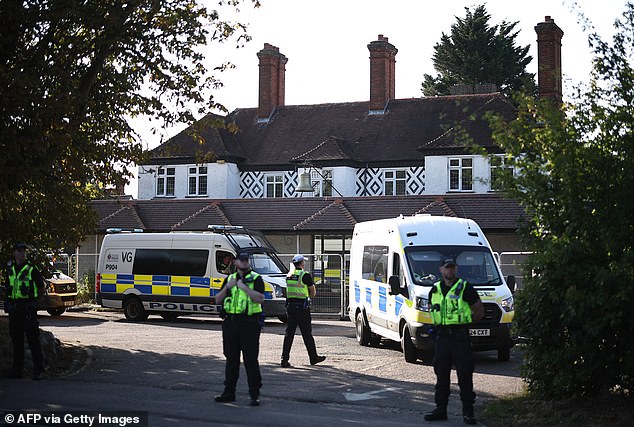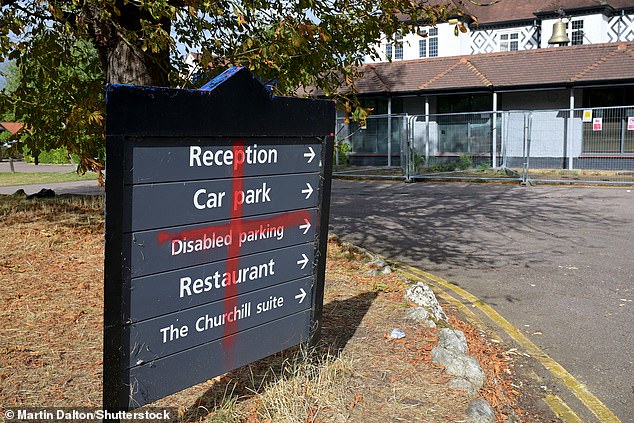Council chiefs' last-ditch attempt to block asylum seekers being housed at a controversial hotel in Essex is to be heard at the High Cou...
Council chiefs' last-ditch attempt to block asylum seekers being housed at a controversial hotel in Essex is to be heard at the High Court today.
Epping Forest District Council is taking legal action against Somani Hotels over the use of the Bell Hotel, with the Home Office intervening in the case.
The facility, home to dozens of illegal migrants, has been at the centre of a political maelstrom in recent weeks.
Thousands of people have protested at the site, demanding that the foreign guests be booted out, while counter-protesters have accused anti-migrant activists of racism.
Violent demonstrations ignited after a migrant at the hotel was accused of sexually assaulting two young girls in Epping just days after arriving in Britain illegally.
The disorder has led to police officers being drafted in from across the UK in a bid to contain the mayhem, which has since spread to other parts of the country amid growing calls for asylum hotels to be outlawed.
Last month, Epping council secured a crucial victory in its fight to close the Bell, after being granted a temporary injunction by the High Court, which would have forced 138 asylum seekers to leave by September 12.
But on Friday, campaigners were dealt a major blow after the Court of Appeal overturned the decision, ruling instead in favour of the Home Office.



The authority's bid for a permanent injunction is now due to be heard across three days at the Royal Courts of Justice in London. The hearing before Mr Justice Mould will begin at 10.30am on Wednesday.
Somani Hotels and the Home Office are opposing the claim.
The Bell became the focal point of several protests and counter-protests in the summer after an asylum seeker housed there was charged with sexually assaulting a teenage girl in Epping in July.
Hadush Gerberslasie Kebatu, an Ethiopian national who arrived in the UK on a small boat days before the incident, was jailed for 12 months in September.
A second asylum seeker who was a resident at the hotel, Syrian national Mohammed Sharwarq, was also jailed for 16 weeks last month after admitting assaulting two fellow residents and two members of staff at the site.
Several others were also charged with offences related to demonstrations outside the hotel.
EFDC issued legal proceedings against Somani Hotels in August over an alleged breach of planning rules, which its barristers told the High Court was causing a 'very serious problem' which 'could not be much worse'.
Mr Justice Eyre granted the council a temporary injunction on August 19, but Somani Hotels and the Home Office both successfully challenged the ruling at the Court of Appeal.

The judge there, Lord Justice Bean, overturned the lower court's decision in favour of Epping, saying the temporary injunction ruling was 'seriously flawed in principle'.
News of the dramatic u-turn sparked outrage, with protests spreading to cities across the UK, sparking accusations the government was 'taking the side of migrants over Britons'.
Following the Court of Appeal's judgment, Home Office minister Dame Angela Eagle said the Government was committed to closing all asylum hotels by the end of this Parliament.
But she added that it appealed against the High Court ruling so that hotel use can be ended in a 'controlled and orderly way'.
Prime Minister Sir Keir Starmer also said that he 'completely' gets people's concerns about migration, adding: 'When it comes to the asylum hotels, I want them emptied.'
But Conservative leader Kemi Badenoch said after the ruling that Sir Keir 'puts the rights of illegal immigrants above the rights of British people'.
She also urged Tory councils to proceed with legal action over the use of hotels as accommodation for asylum seekers in their areas.
In September, the Home Office lost a bid to delay Wednesday's hearing by six weeks, as its barristers said there should be a 'period of reflection' after the Court of Appeal's ruling.
Mr Justice Eyre dismissed the bid, saying: 'It is in the interests of all that the matters affecting the Bell Hotel are resolved in a reasonably expeditious way.'
Education Secretary Bridget Phillipson insisted earlier this month the Home Office was right to argue the rights of asylum seekers trumped those of local residents in the Essex town.
She said the axing of the Bell Hotel would have triggered 'lots of disruption' and would have left people 'on the streets'.

She told Sky News's Sunday Morning With Trevor Phillips programme: 'I completely understand why many people in places like Epping, where hotels have opened up, feel incredibly frustrated about that.
'They have a right to demonstrate lawfully and peacefully. But where it crosses a line that isn't consistent with our long-standing traditions in this country of respect for the rule of law, respect for the police and our responsibility to make sure that we have safe communities for everybody living there.'
Following her comments, Nigel Farage warned Labour now was on the cusp of a catastrophic wipeout in the polls over the fiasco, which he said would see support for his Reform UK party skyrocket.
Mr Farage told the Mail: 'The question is 'whose side are you on'. Clearly the government in the case of Epping has said the illegal immigrants. Reform says the mothers of Epping. This will drive many more voters towards us.'
The migrant hotel scheme is currently set to cost the UK taxpayer billions of pounds to fund.
Home Secretary Yvette Cooper has vowed to overhaul the asylum system in a bid to cut down the number of migrants staying in hotels while they wait to find out whether or not they will be deported.
Currently, there are about 32,000 asylum seekers still housed in hotels nationally.
Ms Cooper said that, while initial decisions on asylum applications had been sped up, there had been 'unacceptable delays' when people who were turned down decided to appeal.
At the moment, it takes on average just over a year for an appeal to be heard - with 51,000 cases still awaiting a decision.
During this time, failed asylum seekers are accommodated at the taxpayer's expense.
A report by government spending watchdog the National Audit Office earlier this year warned the cost of asylum hotel contracts had ballooned from a predicted £4.5billion to £15.3billion over ten years.
During 2024/2025, Britain spent about £108million a month on housing migrants in hotels.
The Home Office said: 'At its peak, less than two years ago, there were 400 asylum hotels in use at a cost of almost £9million a day.
'We have taken urgent action over the past year to fix that system, doubling the rate of asylum decision-making, and reducing the amount of money spent on asylum hotels by almost a billion pounds.'
Read more- Is Britain on the brink of legal upheaval as councils rally against asylum hotels post-Epping ruling?
- Could asylum costs ballooning to a staggering £15.3 billion be the catalyst for a major overhaul of Britain's migrant hotel scheme?
- Why has the UK’s £5.7 million daily bill for asylum seeker hotels sparked urgent reforms, aiming to save taxpayers billions?
- How is the ongoing turmoil in Epping highlighting the fierce debate over asylum hotels and government policies across the UK?
- Is Britain facing a housing crisis for asylum seekers after the shock High Court ruling on migrant hotels?




COMMENTS